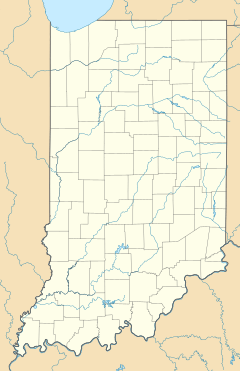Palmer, Indiana facts for kids
Quick facts for kids
Palmer, Indiana
|
|
|---|---|
| Country | United States |
| State | Indiana |
| County | Lake |
| Township | Winfield |
| Elevation | 728 ft (222 m) |
| ZIP code |
46307 (Crown Point)
|
| Area code(s) | 219 |
| FIPS code | 18-57690 |
| GNIS feature ID | 440845 |
Palmer is a small, quiet community in Lake County, Indiana. It is an unincorporated area, which means it doesn't have its own local government like a town or city. Instead, it's part of Winfield Township.
In 2003, a newspaper article said that Palmer was home to 57 people living in 19 houses. There's even a sign on Randolph Street that says the population is "Just The Way We Like It." Palmer is located near where an old railroad line used to be. It's also close to the Lakes of the Four Seasons neighborhood and the town of Winfield.
Contents
History of Palmer
Early Beginnings
The story of Palmer began in 1854. That year, a man named David Palmer moved from Ohio to what is now the town of Winfield. In 1860, he bought land in Winfield Township. This land was close to the border of Porter County. David Palmer started farming on his new land, growing grain and raising animals.
Railroad and Growth
Years later, in 1882, the Chicago and Atlantic Railroad built tracks through Lake County. On November 20, 1882, David Palmer officially created a plan for a town on his land. This plan, called a plat, showed where streets and lots would be. The railroad quickly decided to use Palmer as a station.
By 1915, Palmer was a busy place. It was an important station for shipping milk, livestock, and grain. The community had grown enough to have its own small schoolhouse, which was called the Palmer School.
Mid-Century Life
Around the middle of the 20th century, Palmer had a small area with businesses. This included a pool hall where people could play games. There were also two general stores where residents could buy everyday items. The town even had a telephone company and a blacksmith shop. A blacksmith was a person who made and repaired things out of metal, like tools or horse shoes.
Decline and Changes
Palmer started to change as railroads became less important. Also, a new, larger housing development called Lakes of the Four Seasons began to grow in the 1960s.
The Palmer Elementary School closed its doors in 1966. The general store in Palmer also closed in the early 1970s. This happened because bigger, newer stores were built to serve the growing Lakes of the Four Seasons community.
Railroad service on the tracks through Palmer stopped in the late 1970s. The tracks themselves were completely removed in 1983. These changes led to Palmer becoming the quiet, small community it is today.



